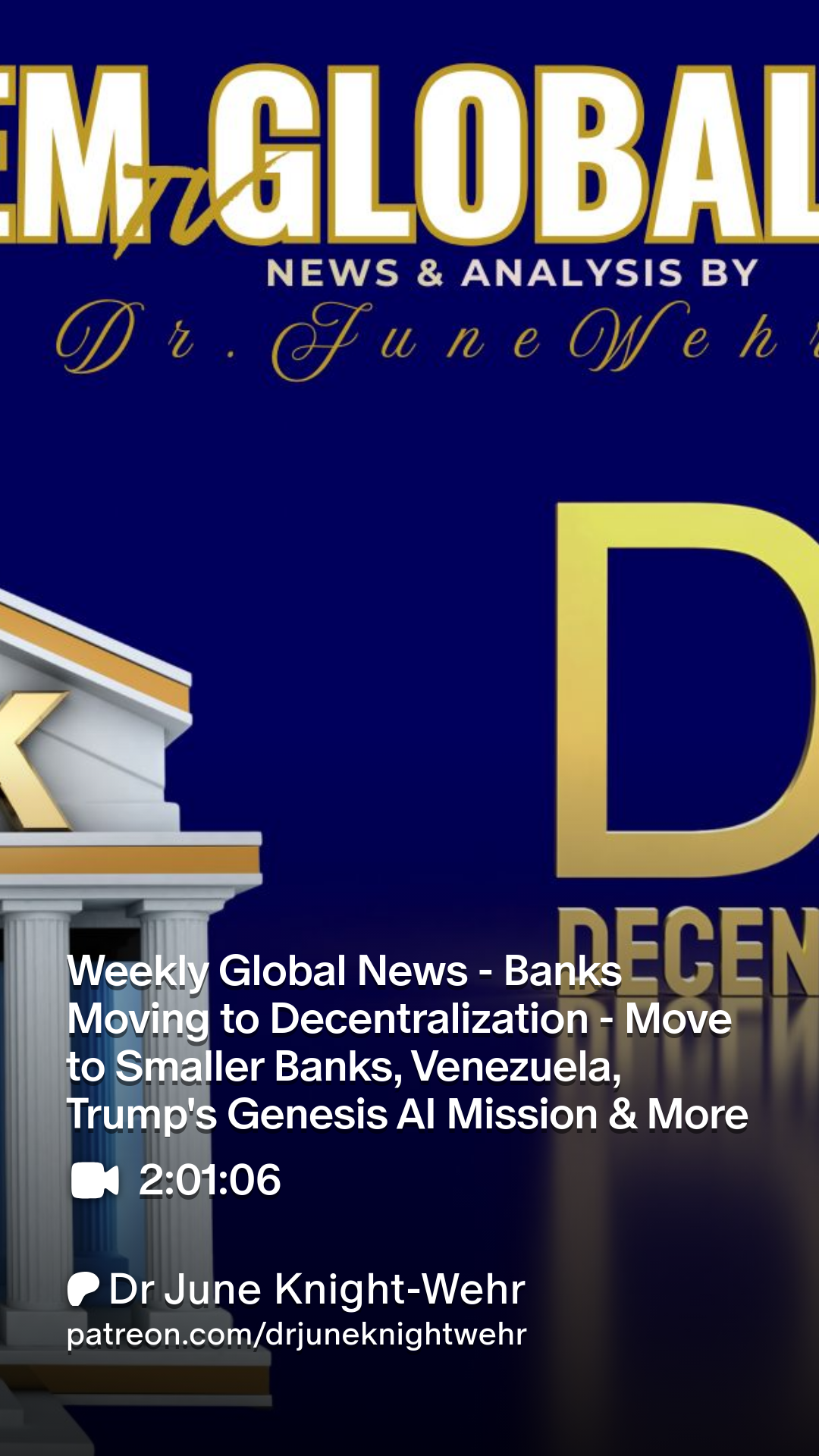
WATCH DR. JUNE'S NEWS
FINANCE NEWS
JUST IN: Kristi Noem Announces New $1 Billion Investment Into TSA Innovations And Technology
WHITE HOUSE: LAUNCHING THE GENESIS MISSION
This order launches the “Genesis Mission” as a dedicated, coordinated national effort to unleash a new age of AI‑accelerated innovation and discovery that can solve the most challenging problems of this century. The Genesis Mission will build an integrated AI platform to harness Federal scientific datasets — the world’s largest collection of such datasets, developed over decades of Federal investments — to train scientific foundation models and create AI agents to test new hypotheses, automate research workflows, and accelerate scientific breakthroughs. The Genesis Mission will bring together our Nation’s research and development resources — combining the efforts of brilliant American scientists, including those at our national laboratories, with pioneering American businesses; world-renowned universities; and existing research infrastructure, data repositories, production plants, and national security sites — to achieve dramatic acceleration in AI development and utilization.
Fact Sheet: President Donald J. Trump Unveils the Genesis Mission to Accelerate AI for Scientific Discovery
Trump’s "Genesis Mission": Why it Kills Startups (And Helps Big Tech)
Trump's Genesis Mission: A New AI Race for America? | Full Analysis
Trump's $500B AI "Genesis Mission" Just Launched
Genesis Mission to AI Mastery! Trump Orders National Labs Across the Country to Work on AI
Trump family’s cryptocurrency ties raise concerns as administration loosens regulations
Goodbye MT Format—SWIFT Retires Legacy Payments in Favor of Blockchain-Friendly ISO 20022
Banks are already going to the blockchain in various ways, with some already holding cryptocurrencies for operational needs and others planning to launch stablecoins or offer crypto custody services in the near future, potentially as early as 2026. The timeline for widespread adoption will likely be staggered, with some institutions leading the way while others may lag due to size or regulatory challenges.
Current adoption and short-term plans
-
Operational crypto holdings: The U.S. Office of the Comptroller of the Currency (OCC) has clarified that national banks can hold cryptocurrencies for operational purposes, such as paying network fees (gas fees) on blockchains.
-
Stablecoin development: Several major U.S. banks, including Bank of America, Citigroup, and JPMorgan, are actively exploring or developing stablecoins for digital payments.
-
Crypto custody services: Citi aims to launch a crypto custody service in 2026.
-
Retail client access: Some banks, like Morgan Stanley, are starting to provide retail clients with access to trade cryptocurrencies like Bitcoin, Ethereum, and Solana, with potential expansion to additional account types in the near future.
Factors influencing the pace of adoption
-
Regulatory environment: Regulatory clarity is a key driver for banks to move forward. Recent guidance from the OCC has helped clear some boundaries for traditional finance in the crypto space.
-
Competitive pressure: Banks are motivated to adopt blockchain technology to remain competitive and to offer faster, cheaper transactions, especially in areas like cross-border payments.
-
Infrastructure and technology: Adopting blockchain at scale requires significant technological infrastructure, including high-performance computing, storage, and low-latency connectivity.
-
Varying capabilities: Smaller regional banks may face more challenges than large institutions in transitioning to the new infrastructure, though technology providers and larger banks may offer services to help them scale.
Banks are beginning to adopt Web3 technologies now, with widespread adoption likely in the next 5-6 years. Many are already exploring areas like stablecoins, crypto custody, and tokenized securities through pilot projects and partnerships, with some services like custody expected to launch in 2026.
Yes, citizens can choose not to use Web3 technologies. Web3 is an emerging concept for a new, decentralized iteration of the internet, but current internet services (Web2) remain dominant and fully functional.
Here are key reasons why citizens can currently opt out:
- Optional Participation: Web3 applications and services are not mandatory for daily life. Users do not need a crypto wallet or an understanding of blockchain to browse the web, use social media, bank online, or access government services.
- User Choice and Control: A core principle of Web3 is user sovereignty, meaning individuals control their own data and identity, rather than relying on centralized entities. This means engagement is based on individual choice and consent.
- Current State of Development: Web3 is still in its early stages. Tools and knowledge are currently accessible to a relatively narrow band of experts, and user-friendly "killer apps" for the general public are still emerging.
- Skepticism and Concerns: Many people are wary of Web3 due to its association with scams, volatility, and security risks, which acts as a major barrier to widespread adoption. The technology is often complex, and many people simply do not care about the underlying mechanics unless there is a clear, simple value proposition.
While the underlying technologies, like blockchain, are seeing increased investment and integration into various industries, a citizen is not required to actively participate in the Web3 ecosystem. The decision to engage is personal, driven by a desire for greater data ownership and security, rather than a universal requirement.
JLens hits $180 million milestone with ‘good’ Jewish-values-based ETF
CBN PROMOTING WEB3 ADOPTION: Elon Musk Says AI Will Make Work and Money Useless - How Does This Idea Fit with a Christian Worldview?
TRUMP NEWS
White House: "I just had a very good telephone call with President Xi, of China.
President Trump could reveal existence of non-human intelligent life in 'near future,' says doc director
First Lady Melania Trump Welcomes the Official 2025 White House Christmas Tree
Nursing not considered a 'professional degree' by Trump administration
FDA approval: The FDA approved Evita Solutions' generic version of mifepristone, which is used in medication abortions
Trump says Dems who told military to defy illegal orders committed 'sedition at the highest level'
Trump expected to unveil new health care cost proposal
Congressman Al Green announces Trump impeachment effort
BREAKING: Rep. Marjorie Taylor Greene has announced that she will resign from Congress. She says her last day will be January 5.
GLOBAL NEWS
US-proposed Ukraine-Russia peace plan now 19 points: Ukrainian official
Caracas Turns Biblical: Maduro Stuns With 'Jesus' Claims, Urges Trump To Be Saved From ‘Demon Of...’
Experts warn of ‘severe’ flu season with fears over new strain
US issues terrifying NOTAM airspace warning as B-52 nuclear bomber conducts 'attack demo': Venezuela crisis spirals
Tyson Foods to close major US beef plant as cattle supplies dwindle
GREG LAURIE: People often ask me, “Who’s your favorite person you’ve ever interviewed?”
Without hesitation, I’d say that among the very top is Vincent Furnier—the man the world knows as Alice Cooper.
Military chief urges Frenchmen to be prepared to 'lose children' to contain Russia
Louisiana officials will soon be able to sue citizens over internet posts with their personal info
An "Equal Parenting Act" is a legislative proposal to change child custody laws to create a legal presumption that equal (or near-equal) parenting time is in the child's best interest, shifting away from the traditional sole custody model.
Mysterious burst of 90 earthquakes jolts California's Bay Area
____________________________________________________________________________________


